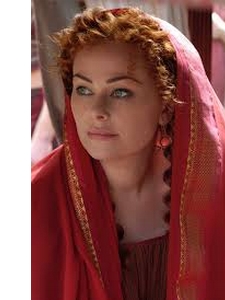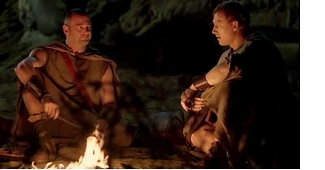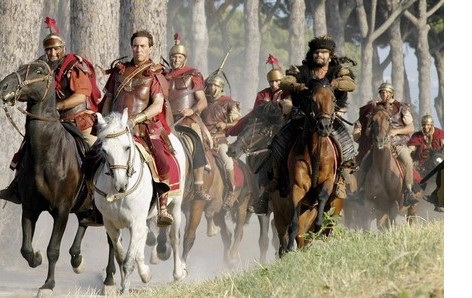In 2005 HBO released season one of Rome. This is among the best historical dramas I’ve ever seen, possibly the best. The writing is superb, the acting is excellent, the production values top notch, and for the most part it’s historically accurate. Accurate in major events, at least, although the conversation and minutiae are crafted.
The core of the story is the fall of the republic and the rise of the dictators, and begins with Caesar in Gaul defeating and accepting the surrender of the king of Gauls, and the earliest breaks in Caesar’s relationship with Pompey Magnus, who rules in Rome as Tribune of the Plebes. In the telling, you’re treated to various facets and styles of Roman life, from slaves to senators. This is done through various intertwined subplots that include Caesar’s chief of staff, Marc Antony, Caesar’s longtime lover Servilia, his niece Atia, Atia’s son Octavian, Atia’s daughter Octavia, centurion Lucius Vorenus, his wife Niobe and legionary Titus Pullo. Vorenus and Pullo are fictionalized versions of the only two infantry soldiers mentioned by name in Caesar’s Commentariat. Among his opponents are Pompey Magnus, Cato, Cicero and Scipio.

There’s far less bloodshed than you might expect looking at the cover. There are a few battles but most are covered as before or after, or short scenes from them. The production itself is astonishing. The marketplace of Rome was completely recreated on a multi acre set. Set’s were built for both Atia’s and Servilia’s villas as well as Vorenus’ subura house. The gear the legionaries wore was accurately reproduced. Clothing and writing implements, jewelry, footwear, are all meant to be historically correct. One of the interesting aspects of the Blu-Ray disc is a feature that can be turned on in the setup that pops up little explanatory windows on occasion that explain the subtle facets of life being portrayed; a window explaining the small offering of food that’s made to a statuette or the purpose of a bust of Janus at a celebration.

Another interesting aspect was brought up by one the writers in commentary. He pointed out that we view Roman civilization and culture through the lenses of Judeo-Christian ethics and Enlightenment philosophy. The Romans did not. Theirs was a world that predated those things. Their religious and philosophical world was populated by a pantheon of capricious gods and, to a lesser extent, the philosophy of the Greeks. What was allowed or not allowed was so because the gods allowed it, or willed it. Fortuna was a goddess, and if she smiled on your life you might be rich, otherwise a slave.
In addition, much is made of Caesar’s ability to use and discard people at will, his willingness to sacrifice everything, including virtually his entire fortune at one point, to achieve his goals absolute power. All of the elite of Rome, as portrayed at least, are jockeying for position and power and wealth at every turn. Ambition, the requirements of social position, family expectations, custom, jealousy, and not least revenge and hatred, all play their parts.
All said and done, this is outstanding entertainment. Amazon Prime members can stream the entire thing for free. The DVD set can be had for $16 and the Blu-Ray box set for $35, which is an amazing value for ten hours of top quality movie making. If you buy it, I predict you’ll watch it more than once.
Some clips I’ve picked to give you a flavor:
Here’s Caesar’s powerful niece Atia discussing separating Caesar from his lover Servilia, who Atia sees as a competitor for influence. She has engaged Titus Pullo to teach young Octavian to fight. The relationship between Octavian and Pullo that develops, and the question of who really fathered Vorenus son become points around which later events eventually pivot. So there’s a surprising lot covered in this short clip.
Here, Marc Antony has just returned from Rome, where he was attacked in the Forum by men of Pompey’s political faction. Caesar is camped outside of Italy, just on the other side of the Rubicon. By law, a commander who led troops into Italy without authorization was committing an act of treason, a capital offense. Any legionaries who followed that commander were also guilty of treason. Here, Caesar persuades the Thirteenth Legion to cross the Rubicon with him and take Rome.
Caesar’s Speech to the 13th Legion
Here, Pompey and his faction of the senate and troops loyal to him have fled Rome. Caesar moves in with his troops and declares martial law.

Interesting. I read Colleen Mccullough books about Caesar and his family. I think I’ll buy the Blue Ray.
I recommend Rome: Season 1.
Season 2, not so much. 7,600 reviewers average a 4-1/2 star rating. That should tell you something.
Having never been a cable subscriber, and only streaming for the last couple of years, I have been surprised at the quality of writing and acting that the Networks have missed. Just got the blue ray version of Deadwood and am hooked on it. Learned they had a 4th season planned, and HBO was hesitant.
I’ll have to put Rome on the list.
We were fans. Watched the entire series when we had HBO, and enjoyed it.
FWIW…..I am not a historian, but I’ve been reading Roman history, both “real” history and historical fiction, for over 50 years, literally 100’s of books. This series was truly a treat, and I’d highly recommend it, for all the reasons stated above.
Excellent series.
The Romans were very different people and it’s an apples to oranges comparison to look at their Republic and ours for parallels. Tom Holland makes this point very well in “Rubicon.”
One of our deliberate advantages in the founding Constitution is the Federal system of limiting and dividing powers. The Jeffersonian Democracy Administrative system that grew naturally and out of our natural local self-governance exponentially magnifies that advantage. We have the Republic then mirrored and as backup if you will in every State Capital and every town that elects it’s own Mayor.
This is a priceless and fantastic advantage over the Roman Republic. When you took Rome the City you took the Republic and later the Empire. In our time if you take Washington DC you have only DC. Why do you think the DOJ is in conflict with so many local law enforcement agencies? The answer is the natural progress of Centralizing Power against the peripheries. This conflict is now of course mortal as BLM is simply a Jacobin Club in the employ of our Centralizing National Power.
We have priceless structural advantages in our Jeffersonian and Federal System’s over Rome. Use them.
Those Structural Administrative advantages combined with the 2d Amendment and further the Left’s racial hatred of Whites – the majority – are why we’re actually not under competent tyranny. We’ll have to fight to live and stay free but we proceed from advantageous position.
The core American political conflict is that we’re not conquered. Yet.
Pah! The cavalrymen are shown using stirrups.
Sod it, now I’m not so sure. When Caesar mounted his horse there were no stirrups.
DM, looking at that photo and larger versions of it, you are correct. They’re using stirrups. Good catch.
It would (I’d guess) be absurdly dangerous to the actors to ask them to ride without stirrups. But you can get Caesar to mount a horse without, which means the director made a well-infomed, rational decision. No complaints from me; I was only indulging in teasing. (Naturally I assume that the director is an avid student of Chicago Boyz.)
Here’s a tale that amused me. A friend’s family moved to rural Queensland when he was a boy. On his first day at his new school, he cycled there. His new classmates mocked him because they’d all ridden there. So the next day he rode there. They all mocked him because he used stirrups.
Good show. Brutality porn. Season two trailed off.
*giggle at Dearie’s tale*
Stirrups – we don’t need no stinkin’ stirrups! We acquired an elderly riding horse when I was a teenager, and my mother taught us all to ride. But the cost of a saddle was out of the question … so we had a thick pad to strap onto the horse, and no stirrups. We all learned very well how to stick to a horse at any speed. I can only remember falling off him once, in the early weeks.
Good show. Brutality porn.
There is some brutality, I agree, but the Roman world – and life outside the Roman world – was brutal. I don’t think the program focuses on brutality, merely that the Romans were casual about it. As the writers noted, they lived in a different world and had a different worldview.